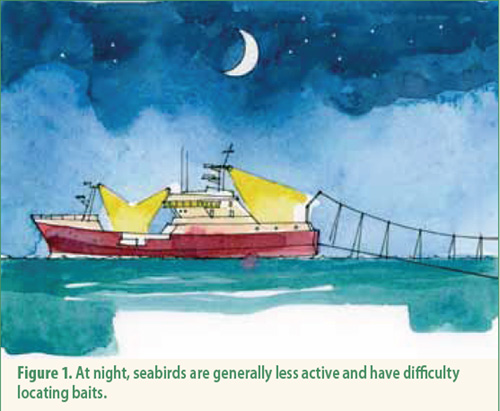Orea Anderson and colleagues of the UK's Royal Society for the Protection of Birds (RSPB) and BirdLife International working with the BirdLife Global Seabird Programme have published an open-access review of how many seabirds are killed by longline fisheries world-wide in the journal Endangered Species Research.
Publication of the review has been set to coincide with World Oceans Day yesterday.
The paper's abstract follows:
"Bycatch in longline fisheries is believed to govern the adverse conservation status of many seabird species, but no comprehensive global assessment has been undertaken. We review the extent of seabird bycatch in all longline fisheries for which data are available. Despite the many inadequacies and assumptions contained therein, we estimate that at least 160000 (and potentially in excess of 320000) seabirds are killed annually. Most frequently caught are albatrosses, petrels and shearwaters, with current levels of mortality liable to be unsustainable for some species and populations. Where realistic comparisons can be made, with data from the 1990s, there is evidence of substantially reduced bycatch in some key fisheries. Reductions stem from decreased fishing effort (especially in Illegal, Unreported and Unregulated (IUU) fishing in the Southern Ocean), and greater and more effective use of technical mitigation measures, notably in demersal fisheries. However, bycatch problems in other fisheries have also emerged. Current concerns include those with previously unidentified bycatch problems (e.g. Spanish Gran Sol demersal fleet) and those where bycatch was identified, but where persistent data gaps prevented adequate assessments of the scale of the impact (e.g. Nordic demersal fisheries). Future assessments will only achieve greater precision when minimum standards of data collection, reporting and analysis are implemented by longline fishing fleets and the relevant regional fishery management organizations. Those fisheries in which bycatch has been substantially reduced demonstrate that the problem of seabird bycatch could be reduced to negligible proportions by enforced implementation of appropriate best-practice mitigation devices and techniques."
Reference:
Anderson, O.R.J., Small, C.J., Croxall, J.P., Dunn, E.K., Sullivan, B.J., Yates, O. & Black, A. 2011. A review of global seabird bycatch in longline fisheries. Endangered Species Research 14: 91-106.
Click here to access the paper's supplementary text and tables giving background data on seabird bycatch estimates for individual longline fleets.
Click here for a press release by the RSPB on this publication and here to visit BirdLife International's Save the Albatross Campaign.
With thanks to Orea Anderson for information

John Cooper, ACAP Information Officer, 9 June 2011, updated 19 June 2011

 Français
Français  English
English  Español
Español